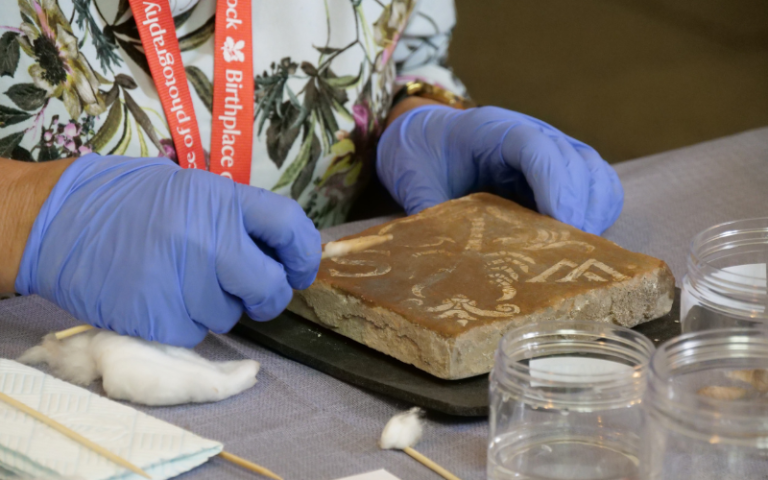UCL and the National Trust: Looking after our history and heritage together
The partnership between UCL and Europe’s biggest conservation charity is helping the heritage sector adapt to change, connect with more people, and embrace new practices.

6 September 2023
With more than five million members, the National Trust is one of Europe’s largest heritage organisations. The charity manages over 350 historic buildings, more than a million objects, and nearly 250,000 hectares of land and coastline spanning England, Wales and Northern Ireland.
Through a strategic partnership with UCL, the Trust is embracing innovative research on heritage science in a more significant way than ever before. This collaboration, formalised in May 2021, has opened the door to exciting new technologies, techniques and ways of working for UCL, the Trust and the heritage sector as a whole.
Looking after the National Trust’s places and collections with world-leading research
In 2019, the National Trust became an Independent Research Organisation, a status awarded by UK Research and Innovation to organisations with the existing in-house capacity to carry out research that materially extends and enhances the UK research base.
Embedding collaborative heritage science research across and beyond the Trust’s activities is being taken to an even broader and deeper level through the partnership with UCL.
Tom Dommett, Head of Historic Environment at the National Trust, says: “Our strategic partnership with UCL is helping us go much further to address significant heritage science challenges through innovative and interdisciplinary research. Outputs from this high-quality, collaborative research will give us the evidence we need to make decisions about how to look after the places and objects in our care for many years to come.”
What’s happened so far
UCL is working specifically on the ‘Looking after what we’ve got’ strand of the Trust’s strategic framework for research. Since the partnership was announced a number of secondments, policy placements and research projects have taken place. They include projects to:
- explore the link between the built environment and people’s wellbeing, with the aim of developing new ways to use the Trust’s sites to support vulnerable people
- assess the energy performance of the 3,000 buildings the Trust rents to tenants, to help the Trust meet its net zero targets
- evaluate how archaeology affects the wellbeing of volunteers, to help the Trust and others understand and improve the social impact of their work
- explore a range of anti-racist, decolonial, environmental and climate-related initiatives currently taking place in the heritage sector
- identify significant opportunities for tracking and reducing the carbon footprint of the Trust’s largest construction projects
- explore how to balance the lighting needs of visitors to National Trust properties with conservation requirements for collections
The Trust has also played a key role in the development of a new Heritage, Sustainability and Society BA degree programme at UCL, which is launching at UCL East from September 2024. Providing unique insight into the sector’s evolving needs is helping to ensure UCL’s heritage teaching continues to lead the way globally.
Professor Rodney Harrison (UCL Institute of Archaeology) is a lead academic involved in the partnership. He explains: “These kinds of strategic partnerships are important as they provide opportunities to deliver real world impacts and to take the findings of our research out into the public. The National Trust is a key partner to help deliver changes in heritage policy and practice and provide us with real life laboratories in which we can develop and test new heritage practices and approaches.
“We have a shared focus on heritage and a shared belief in the public benefit that comes from it, and from a research perspective this partnership is allowing us to expand on and accelerate the important heritage work we can do together.”
What’s next?
More projects are now underway or planned.
Later this year we’ll be inviting National Trust specialists into UCL labs to share best practice and apply emerging methodologies to live and critical heritage questions.
A knowledge exchange project is underway to explore financial incentives that would encourage more repairs and improved maintenance conditions for listed heritage assets.
Researchers from both organisations are also working to jointly develop new short courses for archaeology.
Support from UCL Innovation & Enterprise
The partnership with the National Trust has been supported by the Business and Innovation Partnerships team and the Knowledge Exchange Funding team in UCL Innovation & Enterprise.
They helped with all the practical aspects involved with drawing up contracts and negotiations. They’re also helping to map out how the partnership will evolve over the next few years, with more secondments, knowledge exchange initiatives and policy placements being planned. The knowledge exchange placements so far have been funded by Higher Education Innovation Funding, managed by UCL Innovation & Enterprise.
“In particular, it’s been very helpful for me to leave the negotiations aspect to the Business and Innovation Partnerships team in UCL Innovation & Enterprise, so I can focus on my research and teaching,” says Professor Harrison. “While I’ve worked on a number of individual research projects with the National Trust as partners in the past, UCL’s support for this partnership at a more strategic level has allowed us to accelerate and expand beyond what would have been possible on individual projects.”
Links
Find out more about:
- how UCL is transforming lives through collaboration and knowledge exchange
- support for external organisations to partner with UCL
- support for staff to partner with external organisations
- UCL East
- UCL Heritage, Sustainability and Society BA degree
- Research at the National Trust
Photo © National Trust Images/Alana Wright
 Close
Close

